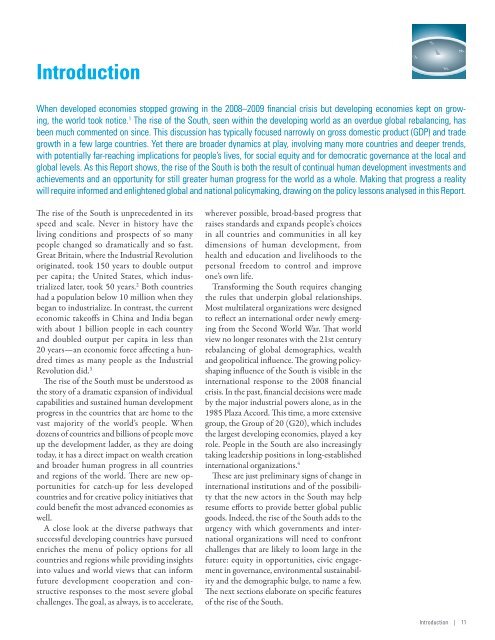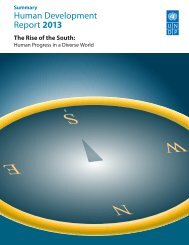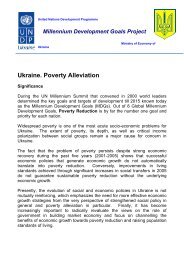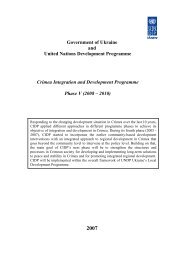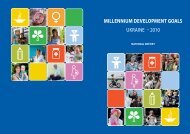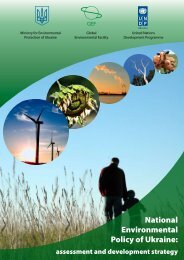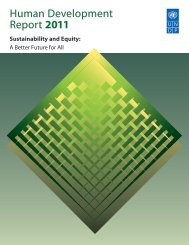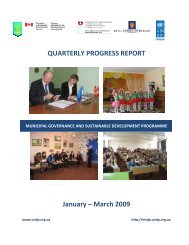E N S W - United Nations Development Programme
E N S W - United Nations Development Programme
E N S W - United Nations Development Programme
You also want an ePaper? Increase the reach of your titles
YUMPU automatically turns print PDFs into web optimized ePapers that Google loves.
Introduction<br />
When developed economies stopped growing in the 2008–2009 financial crisis but developing economies kept on growing,<br />
the world took notice. 1 The rise of the South, seen within the developing world as an overdue global rebalancing, has<br />
been much commented on since. This discussion has typically focused narrowly on gross domestic product (GDP) and trade<br />
growth in a few large countries. Yet there are broader dynamics at play, involving many more countries and deeper trends,<br />
with potentially far-reaching implications for people’s lives, for social equity and for democratic governance at the local and<br />
global levels. As this Report shows, the rise of the South is both the result of continual human development investments and<br />
achievements and an opportunity for still greater human progress for the world as a whole. Making that progress a reality<br />
will require informed and enlightened global and national policymaking, drawing on the policy lessons analysed in this Report.<br />
The rise of the South is unprecedented in its<br />
speed and scale. Never in history have the<br />
living conditions and prospects of so many<br />
people changed so dramatically and so fast.<br />
Great Britain, where the Industrial Revolution<br />
originated, took 150 years to double output<br />
per capita; the <strong>United</strong> States, which industrialized<br />
later, took 50 years. 2 Both countries<br />
had a population below 10 million when they<br />
began to industrialize. In contrast, the current<br />
economic takeoffs in China and India began<br />
with about 1 billion people in each country<br />
and doubled output per capita in less than<br />
20 years—an economic force affecting a hundred<br />
times as many people as the Industrial<br />
Revolution did. 3<br />
The rise of the South must be understood as<br />
the story of a dramatic expansion of individual<br />
capabilities and sustained human development<br />
progress in the countries that are home to the<br />
vast majority of the world’s people. When<br />
dozens of countries and billions of people move<br />
up the development ladder, as they are doing<br />
today, it has a direct impact on wealth creation<br />
and broader human progress in all countries<br />
and regions of the world. There are new opportunities<br />
for catch-up for less developed<br />
countries and for creative policy initiatives that<br />
could benefit the most advanced economies as<br />
well.<br />
A close look at the diverse pathways that<br />
successful developing countries have pursued<br />
enriches the menu of policy options for all<br />
countries and regions while providing insights<br />
into values and world views that can inform<br />
future development cooperation and constructive<br />
responses to the most severe global<br />
challenges. The goal, as always, is to accelerate,<br />
wherever possible, broad-based progress that<br />
raises standards and expands people’s choices<br />
in all countries and communities in all key<br />
dimensions of human development, from<br />
health and education and livelihoods to the<br />
personal freedom to control and improve<br />
one’s own life.<br />
Transforming the South requires changing<br />
the rules that underpin global relationships.<br />
Most multilateral organizations were designed<br />
to reflect an international order newly emerging<br />
from the Second World War. That world<br />
view no longer resonates with the 21st century<br />
rebalancing of global demographics, wealth<br />
and geopolitical influence. The growing policyshaping<br />
influence of the South is visible in the<br />
international response to the 2008 financial<br />
crisis. In the past, financial decisions were made<br />
by the major industrial powers alone, as in the<br />
1985 Plaza Accord. This time, a more extensive<br />
group, the Group of 20 (G20), which includes<br />
the largest developing economies, played a key<br />
role. People in the South are also increasingly<br />
taking leadership positions in long-established<br />
international organizations. 4<br />
These are just preliminary signs of change in<br />
international institutions and of the possibility<br />
that the new actors in the South may help<br />
resume efforts to provide better global public<br />
goods. Indeed, the rise of the South adds to the<br />
urgency with which governments and international<br />
organizations will need to confront<br />
challenges that are likely to loom large in the<br />
future: equity in opportunities, civic engagement<br />
in governance, environmental sustainability<br />
and the demographic bulge, to name a few.<br />
The next sections elaborate on specific features<br />
of the rise of the South.<br />
Introduction | 11


